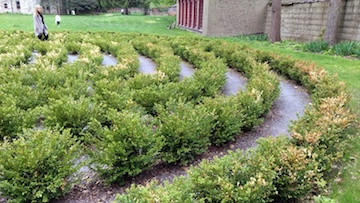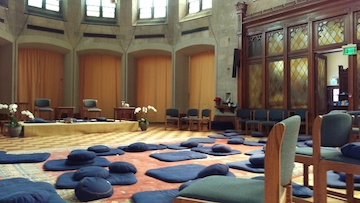Mindful Lawyering — Does Such a Thing Exist?
Last week I attended a mindful lawyering retreat along with 70 other interested attorneys and judges. I pause here for a moment to allow you to snicker at the thought. . . . Any non-lawyer I told this to did just that, and then good-naturedly listened. But it’s true. We spent 3 ½ days in silence with the exception of several break-outs sessions that didn’t last very long. We were discouraged from opening our emails, answering our phones, or reading pleasure books we may have brought along. (I brought two.) The Garrison Institute, a former Franciscan monastery built on the banks of the Hudson River in upstate New York hosted us. The UC Berkeley School of Law Initiative for Mindfulness in the Law, Columbia Law School, and the Community Legal Resource Network at CUNY School of Law sponsored us
I was there for the same reason most of us were: to meditate, to learn to continue to do so when it was over, and to bring ‘mindfulness’ into my law practice and my life. Why? It’s been crazy. The practice of meditation is intended to clear of mind of its daily rumblings and nightly mumblings. At the retreat, we practiced a profound slow down. First comes stillness of the body, hopefully followed by stillness of the mind. When the mind clears itself out, it should open itself up to focus better on the job before us, to listen without distraction or defensiveness to the persons in our presence, to wait before passing judgments and jumping to conclusions. If it really takes hold, mindfulness unlocks our hearts to becoming wiser, more creative and more compassionate.
When mindfulness takes place in the legal arena—and would do so without much fanfare—then the sentiment that “justice has been serve” is real. Mindful lawyering doesn’t splash the headlines. The social airwaves overtake us with news of violence and tragedies of abuse of police power, the Boston Bomber’s terror, school shootings, and the heroin epidemic. On a smaller scale, however, big, good things are happening: Legal communities attend seminars on understanding human behavior trying to find answers, for example, on how is it that a person learns to inflict domestic violence. Or what makes a couple’s behavior escalate to such a nasty pitch in divorces where the parties end up arguing over arguing?
Today, hundreds of schools offer degrees in conflict resolution. The University of Akron School of Law offers certificate programs in family conflict, gender conflict, and racial conflict. Restorative justice programs focus on the needs of victims, offenders and the community. The Center for Peaceful Change (now called the Center for Applied Conflict Management) was created at Kent State University because of the events of May 4, 1970. Our Ohio Supreme Court has organized a task force on access to justice. “The issue of access to justice for all is not a new one. For decades, states have struggled with providing civil legal services to the indigent.” Therapeutic jurisprudence studies how the emotions, behaviors and mental health of those involved affect the legal system. The mission of Domestic Relations Court in Cuyahoga County is “to help families restructure their lives by reaching compassionate and just resolutions.”
These measures are designed to problem-solve, not to win at all cost. They don’t scoff at the value of our human dignity and our need for one another. These measures don’t get much attention. Systems—actually the people in them—grasp the need for change. The public’s belief about lawyers and the law may be otherwise. Go ahead and laugh again when I report a wish expressed by a fellow retreat goer: “Wouldn’t it be great if even in contested cases we could take a time out from discovery disputes and stalled negotiations and meet opposing counsel for lunch to ask honestly what obstacles are impeding negotiations? I doubt that identifying ourselves as “mindful” will get us anywhere with adversarial counsel, but modeling openness, non-retaliation in email and overall friendliness may be a place to begin.” From this lawyer who chooses to “out” herself as trying to be mindful, yes, it would be great.
- The Garrison Institute
- Berkley Initiative for Mindfulness in Law
- The Center for Applied Conflict Management (formerly The Center for Peaceful Change), Kent State University



